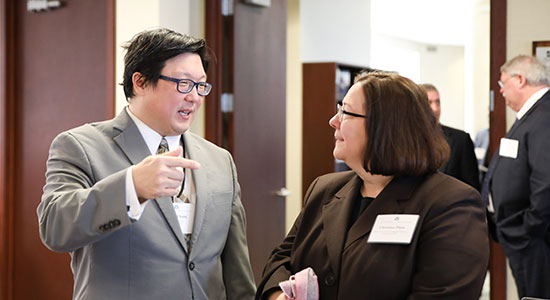
Michael Yang, Asian American Bar Association Liaison to the State Bar of Wisconsin Board of Governors, chats with Christine Plum, a State Bar delegate to the ABA House of Delegates, before the start of the board meeting Feb. 15 at the State Bar Center in Madison.
Feb. 18, 2019 – The State Bar of Wisconsin’s Board of Governors (board) engaged in a robust discussion last Friday on potential changes to rules that regulate Wisconsin lawyers, as recommended by a committee for the Office of Lawyer Regulation (OLR).
The Wisconsin Supreme Court, in 2016, appointed an OLR committee to review OLR procedures and structure, and to report back to the supreme court “recommendations that would increase efficiency, effectiveness, and fairness of the OLR process.”
The OLR Procedures Committee, chaired by Racine County Circuit Court Judge Gerald Ptacek, completed its final report with recommendations in October 2018. Ultimately, final recommendations will go the supreme court in the form of rule change petitions.
The State Bar’s Policy Committee and the Professional Ethics Committee reviewed the OLR committee’s final report and recommendations and raised various comments for consideration by the State Bar board, which could support or oppose any OLR petitions.
At the Feb. 15 board meeting, Dist. 10 Governor and Policy Committee Chair Chuck Stertz highlighted the considerations raised by the policy and ethics committees regarding the final recommendations, and the board discussed them at length.
Specifically, the board discussed six proposed changes to rules that govern the lawyer regulation system and procedures, at SCR Chapters 21 and 22. The OLR committee’s final report makes other recommendations that the board did not discuss.
1) Notice to Employer. The OLR committee recommends a rule, under SCR 22.03 (investigations), requiring an attorney who receives a notice that an OLR investigation is underway regarding an allegation that the attorney engaged in misconduct to provide a copy of the notice to a supervisor, partner, or shareholder in the attorney’s law firm or the law firm where the lawyer worked at the time of the alleged misconduct.
Under the proposal, the OLR may directly transmit a copy of the notice of investigation to the attorney’s supervisor, or a shareholder or partner in the attorney’s firm.
Dist. 6 Gov. Jesse Blocher said he opposed the proposed change. “Whether or not lawyers are required to report to their firms can be left to the firm’s themselves,” said Blocher, noting the change could turn a private reprimand into a public one.
Blocher said the proposed rule would require the employer to be informed before any determination of whether the lawyer did anything wrong. “I think it’s a bad rule,” he said.
Public board member and supreme court appointee Jim Marshall said requiring the employer to be informed could minimize risk to other attorneys in the firm. “I see another side, but I can’t give weight to what’s more important,” he said.
Dist. 9 Gov. Patricia Putney said a lot of misconduct claims are meritless, more so in certain practice areas, and notice at the investigation stage seems premature. “Notice would seem important if in fact the lawyer is reprimanded,” Putney said.
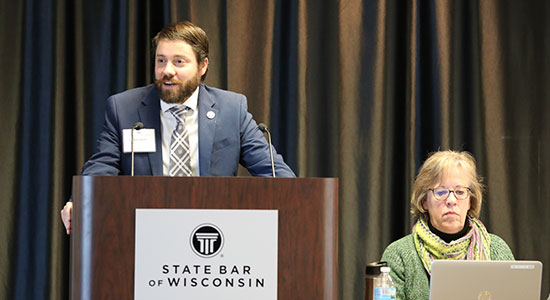
Chuck Stertz, chair of the board's Policy Committee, led discussion on proposed changes to rules that impact the lawyer regulation system. A committee for the Office of Lawyer Regulation (OLR) released a report with recommendations for changes in October 2018.
2) Reporting Misconduct of Another Lawyer. The OLR committee recommends amending SCR 20:8.3, which currently requires a lawyer “who knows that another lawyer has committed a violation of the Rules of Professional Conduct that raises a substantial question as to that lawyer’s honesty, trustworthiness or fitness as a lawyer in other respects” to inform the appropriate professional authority, such as OLR.
The proposed amendment would require a lawyer to report another lawyer to a professional authority if the lawyer “reasonably believes” – instead of “knows” – that another lawyer committed a violation of the ethics rules.
“You have to read this one very carefully,” said Senior Lawyer Division (SLD) Rep. Steven Sorenson, former State Bar president. “What this says is that I violate the rules if I don’t report an attorney that I reasonably believe has committed a violation.”
Sorenson says it puts all attorneys in the role of being an OLR investigator, in the sense that the lawyer has to make a determination based on a reasonable belief standard. “This opens up a Pandora’s box,” said Sorenson. “I don’t think this was the intent.”
Blocher of Dist. 6 in Waukesha said the proposed amendment departs from the ABA Model Rules and would create confusion. “A bright-line standard is much better.”
3) Suspensions by Referees. The OLR committee recommends amending SCR 21.08 (Referees) to allow referees to impose discipline in attorney misconduct cases if the referee imposes a suspension for a period not exceeding three months.
Currently, referees do not impose discipline. They make findings, conclusions, and recommendations and submit them to the supreme court for appropriate action.
Stertz said this amendment is likely an attempt to unclog the supreme court’s docket, by giving referees more authority in cases alleging more minor violations.
Dist. 2 Gov. Amy Wochos said she favored the change, noting that the OLR process can be slow, and allowing referees to make these decisions could create efficiency.
But State Bar President-elect Jill Kastner said that allowing the referee to unilaterally impose discipline, even for three months or less, would violate due process if there is no opportunity to appeal. Blocher said there is a right to appeal, but it’s unclear what the standard of review might be on appeal, and any appeal should be reviewed de novo.
Dist. 2 Gov. Krista LaFave Rosolino noted that a three-month suspension is not a short period of time. “For those in solo or small firms, that could really impact your business.”
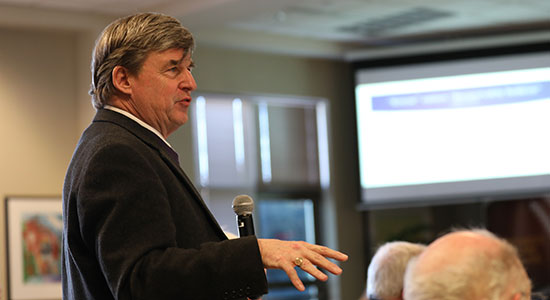
Steve Sorenson, the Senior Lawyer Division representative on the board and former State Bar president, weighs in on proposed changes to rules that regulate lawyer misconduct.
4) Permanent Revocation. The OLR committee recommends amending SCR 21.16 and SCR 22.29 to allow the supreme court to permanently revoke an attorney’s license with no opportunity for the license to be reinstated.
Currently, the supreme court may revoke an attorney’s license to practice law, but the attorney may petition for reinstatement any time after five years. The supreme court can decline reinstatement, but the attorney still has the right to seek reinstatement.
Sorenson said that is “capital punishment” for a lawyer. “I don’t think we should ever encourage permanent revocation. We should always keep open the possibility that someone can redeem themselves. That should be our position as lawyers,” he said.
Nonresident Lawyer Division Rep. Kathryn Bullon agreed. “To revoke someone’s license and never, ever give them a chance at penance or rehabilitation and to regain their profession and livelihood, seems unduly harsh,” said Bullon.
Dist. 9 Gov. Truscenialyn Brooks said serious criminals can be sent to prison forever, with no possibility of parole. She suggested the public may raise eyebrows if a different standard applies to lawyers who commit egregious misconduct.
Dist. 2 Gov. Gregg Herman suggested the terms should change, to be more transparent. In other words, we should not use the term “revocation” if it really means “suspension” with the possibility of reinstatement after five years, since that’s confusing for the public.
5) Elimination of District Committees. The OLR committee recommends eliminating district committees. Under SCR 21.06, lawyers and public members are appointed in each state bar district to assist OLR investigations and provide other support.
The OLR report says “the work performed by District Committee may be redundant and the [OLR] Director has available resources that fulfill the role historically assumed by the District Committee.” But various board members raised concerns with eliminating district committees, which allow lawyers and the public to participate at the local level.
“The problem is, we have that system that gives local insight. You lose all that when you have a group of people who are making the decisions from Madison,” said Sorenson.
Sorenson said the State Bar should help OLR make district committees more effective and efficient, rather than eliminating them. He said the number of complaints have not decreased, but OLR is referring fewer cases to the district committees.
Dist. 4 Gov. Mary Lynne Donohue generally agreed. She said local lawyers and public members have a base of knowledge and a local perspective to determine what went wrong. “I think the solution is to reinvest in district committees,” she said.
Dist. 9 Gov. 9 Gov. Kathy Chung said the district committees system isn’t functioning properly because many seats on district committees are vacant. “We have ceded the responsibility by failing to staff our own committees,” she said.
6) Agreements Against Grievances. The OLR committee recommends amending SCR 201.8(3)(h)(3), which prohibits lawyers from making agreements with clients that limit the client’s right to report the lawyer’s conduct to disciplinary authorities.
Under the proposal, the rule would prohibit such agreements with any “person.” Sorenson said this is a technical correction, and an appropriate change, because a lawyer’s client is not the only person who can report alleged lawyer misconduct to OLR.
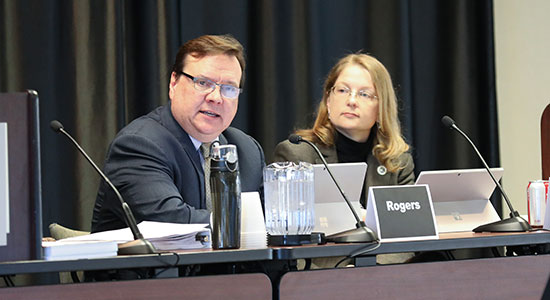
State Bar President Christopher Rogers (left) and President-elect Jill Kastner.
Board Discusses Proposed FY 2020 Budget
The board discussed, but took no action on, the proposed State Bar budget for FY 2020 (July 1, 2019 to June 30, 2020), which includes a proposed $2 dues increase. The board will likely vote on the budget at its April meeting.
The proposed budget request of $11.77 million, fairly equivalent to the last two approved budgets, closely aligns resources with the State Bar’s strategic priorities and goals.
The State Bar’s strategic goals advance the organization’s efforts to prioritize and realign activities to improve efficiency and delivery. The board’s Strategic Planning Committee led those efforts in the last year, including a rigorous cost-benefit analysis.
“We gained clarity about the need to focus on the core functions of the organization that really add value, focusing less on those that don’t,” said Susan Miller, chair of the board’s Strategic Planning Committee.
The proposed budget reflects more than $400,000 in expense cuts, through the elimination or reduction of numerous programs, services, and other costs.
For instance, a decision to reassign some critical functions among existing staff and leave various vacant positions unfilled will result in significant savings on personnel costs in FY 2020.
After several rounds of budget adjustments, the State Bar’s Finance Committee determined that using $30,000 from the dues stabilization reserve fund and a $2 per member dues increase, from $258 to $260 for full dues paying members, was necessary to balance the budget. Operations are thus breakeven under the proposed 2020 budget.
However, the proposed budget does show a bottom-line surplus of $154,000, which equates to the non-operating revenue anticipated from market growth of investments during the year.
The State Bar dues have increased by $34 in the last 14 years. Dues increased by $30 in 2015, the first dues increase in a decade. In FY 2018, the dues increased by $4.
About 45 percent of the proposed 2020 budget relies on membership dues. The remainder is funded by other revenue sources, including sales and registrations.
“I think we are running as lean as we can be,” said State Bar Treasurer John Danner, a member of the Finance Committee. “Under the philosophy that we are going to do less and do it better, we need to budget for the process. This is a sound budget.”
Finance Committee Chair Sherry Coley noted that the budget process involved looking at each and every State Bar activity with a critical eye to make funding decisions. “We are at a point where all the low-hanging fruit is gone,” said Coley.
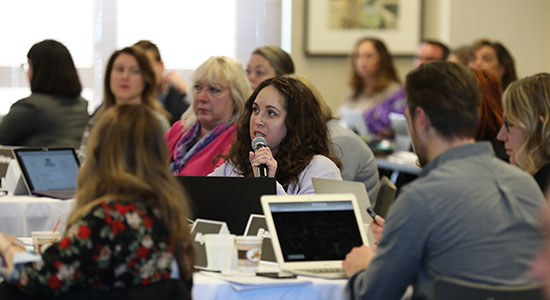
Dist. 2 Gov. Krista LaFave Rosolino, Milwaukee, joins the discussion.
Dist. 15 Gov. Gretchen Rosenke, a government lawyer, said any dues increase, however small, is still a hard sell to government attorneys, who may not view the State Bar’s offerings as relevant or useful to them.
State Bar President Christopher Rogers said it’s a valid concern that should be raised outside the context of the budget. “We have to answer that question regardless of a dues increase," said Rogers, who said the State Bar must continue to drive value for all segments of the membership.
At the same time, Rogers noted that there was no dues increase last year while the cost of living rose by around 3.5 percent, and is set to rise by a similar percentage this year.
Coley noted the State Bar’s lobbying efforts directly impact government lawyers, including efforts to increase pay for public defenders and prosecutors. Others mentioned programs like WisLAP and the Ethics hotline, which are accessed by a wide spectrum of lawyers, including government lawyers.
Jim Marshall, the court-appointed public member on the board, said “there are many things the bar is doing that our members don’t realize we are doing.” He said better communication with constituent groups could help members understand what they are getting for their membership, and help the State Bar better understand their needs.
Dist. 9 Gov. Kathleen Chung noted that budgeting is increasingly difficult as more lawyers retire or take emeritus status, available at age 70. Emeritus lawyers are exempt from paying dues (and taking CLE) even if they continue to practice law full time.
“Fewer new lawyers are coming in to replace them,” Chung said. “It’s a numerical problem." She noted that more creative ideas will be needed to fund future budgets.
State Bar of Wisconsin’s Strategic Goals
The State Bar of Wisconsin’s strategic goals, as approved by the board, relate to:
-
Professionalism
a) Foster the development of a regulated legal community through the Ethics program.
b) Promote a high-functioning justice system so the Wisconsin legal community can better serve the public.
c) Promote a high-functioning justice system through a representative legal profession so the Wisconsin legal community can better serve the public.
d) Foster development of a representative Wisconsin legal community of leaders through its Leadership Program.
-
Provide resources for lawyers to optimize their potential for professional and personal growth.
-
Foster the development of a Wisconsin legal community that is engaged for advocacy.
-
Make sustainable gains in efforts to increase equal access to justice for all Wisconsin residents so that more people can obtain the legal assistance they need to meet their basic legal needs.
Board Approves Keller Dues Rebate Amount
The board approved a Keller dues rebate amount of $15.45 for FY 2020, which is the amount that full dues paying members can opt to withhold from their dues.
Under Keller v. State Bar of California, 496 U.S. 1 (1990), and subsequent rulings, mandatory bar associations can use compulsory dues to fund activities “necessarily or reasonably related to the purposes of regulating the legal profession or improving the quality of legal services.” Keller is codified in Wisconsin SCR 10.03(5)(b)1.
Under Keller, the State Bar is permitted to fund lobbying and other activities related to these purposes with mandatory dues. But lobbying and other activities not germane to those purposes cannot be funded with the compulsory dues of objecting members.
Thus, the State Bar annually calculates the Keller dues rebate amount – the amount used for activities that cannot be funded with mandatory dues – and objecting members can choose to withhold the rebate amount on their annual dues statements.
Last year, the board adopted a policy to include all direct state and federal lobbying activity within the Keller rebate calculation, even lobbying activity deemed germane to regulating the legal profession or improving the quality of legal services.
In the past, members have challenged the State Bar’s use of mandatory dues for any direct lobbying activity on First Amendment and other grounds. Those challenges have consistently failed because of Keller and subsequent rulings.
The board’s decision to include all direct lobbying activity in the rebate amount, as a State Bar policy, recognizes the concerns of members who object to the use of mandatory dues for any direct lobbying activity, regardless of what Keller permits.
The Keller rebate amount now includes activities that constitute direct lobbying on policy matters before the Wisconsin Legislature and U.S Congress, “regardless of whether they would otherwise qualify as chargeable under a Wisconsin Keller dues analysis.”
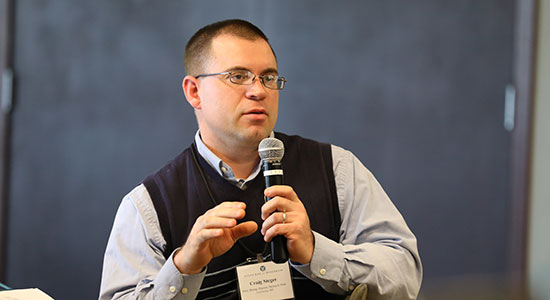
Dist. 5 Gov. Craig Steger, La Crosse, provides his perspective at the board meeting.
Board Approves Proposal for Electronic Voting
The board approved the filing of a petition to the Wisconsin Supreme Court to amend court rules and State Bar bylaws to allow electronic balloting for annual elections to State Bar officer positions and for the Board of Governors, as well as voting on State Bar referendums. Currently, only section and division boards use electronic balloting.
State Bar Executive Director Larry J. Martin said electronic voting would save the State Bar about $30,000 and hopefully will increase voter participation rates in State Bar elections.
Upon request, interested members may obtain a copy of the minutes of each meeting of the Board of Governors. For more information, contact State Bar Executive Coordinator Jan Marks by email or by phone at (608) 250-6106.
